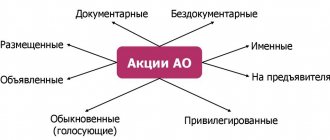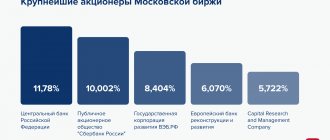The correct operation of the stock market is ensured by the regulator (in our country this is the Bank of Russia) - it sets the rules of the game and ensures that these rules are followed. All transactions take place on the exchange, where a large number of participants interact.
How the exchange works
These include depositories, which are responsible for storing securities, and registrars, which record who is the owner of the instrument. There are also clearing centers that make sure that the seller receives his money and the buyer receives the asset, and dealers who carry out transactions on the market on their own behalf and at their own expense. We examine in detail how the exchange works here.
But those closest to the client are brokers and management companies through which investors make transactions.
How to put together an investment portfolio that will bring income
A broker is a company that makes transactions on the financial market on behalf of a client using his funds or on its own behalf at the expense of the client. Such an intermediary is suitable for an investor who plans to independently compose his investment portfolio and monitor the market. The client gives an order to the broker to buy or sell a particular asset, and the broker executes it as soon as another order to sell or buy appears on the market at the stated price. By selling securities at a price higher than you bought them, you earn income. The broker takes a commission for each transaction.
A broker is a company that makes transactions on the financial market on behalf of a client using his funds.
If you do not have the time or lack the knowledge to independently monitor the rapidly changing market, then it is better to trust the professionals from the management company. They will help you choose investment instruments in accordance with your goals.
The management company makes transactions to generate income on its behalf according to the strategy chosen by the client. To do this, the investor buys shares of mutual funds, which in turn invest in a whole basket of assets, which helps to diversify the portfolio and obtain optimal returns. Or the client can choose trust management. Here we talked about this in detail.
The management company makes transactions to generate income on its behalf according to the strategy chosen by the client.
How to cooperate with a broker
- Investment style: by opening a brokerage account, the investor determines the investment strategy independently, as well as the set and maturity of instruments in his portfolio.
- Entry threshold: no. An investor can start trading with any amount. It all depends on what kind of asset he wants to buy. There are shares that cost less than the ruble - for example, VTB Bank, or Norilsk Nickel shares, when you have to pay about 20 thousand rubles for one share.
- Commissions: for each transaction, the broker charges a commission, which is measured from hundredths to tenths of a percent and depends on the tariff, the amount of funds in the account and the frequency of transactions. In addition, some brokers charge additional monthly fees for brokerage accounts in which the investor holds less than a certain amount, as well as custodial costs (usually a fixed monthly amount).
- Available tools: An investor can only access Qualified Investor Products after qualifying. In addition, not all brokers provide their clients with access to a wide range of foreign securities.
- Terms of depositing and withdrawing funds: if an operation on behalf of a client can be completed almost instantly, because the price of an instrument can change significantly in a second, then the withdrawal or crediting of funds can wait 1-2 business days.
- Investing in an individual investment account: you can open an individual investment account and independently buy assets into this account.
- Taxes: the broker is a tax agent, so he can independently withhold personal income tax if the investment results are positive and send documents to the tax service.
A broker is not a dealer. Differences and Features
Newbies to the stock markets have several common problems, in particular, they have difficulty distinguishing between a dealer and a broker and are constantly confused about these concepts. This is because beginners are not yet very well versed in exchange processes - they cannot see the specific actions of participants behind the identifier words. At the beginning of their journey, debutants ask the question: “Dealer and broker - what is it?”, listen to the answer and... continue to confuse these two roles, because both of them involve mediation in the acquisition of assets.
Therefore, we will not simply give definitions, but will try to “grow meat” on each of them and identify the differences, so that specific market processes appear behind the definitions, and it is easier to remember them.
For now, let’s define only the key difference: the dealer is one of the parties to the transaction, but the broker is not.
Dealer and broker - what's the difference?
A dealer can be both an organization and a person who acts as an intermediary and forms quotes.
- He covers the operations himself, purchasing goods or valuables from the seller and reselling them to the buyer with his own trade markup.
- The dealer is not an intermediary in the full sense of the word, because he also participates in transactions, he is an interested party and, rather, is a supplier of assets, a link between other market participants.
- When trading through a dealer, the seller and buyer may not know anything at all about each other - simply one of the parties is selling something that the other party wants to buy.
- The dealer can also act on behalf of one of the parties, i.e. take on expanded intermediary functions, but at the same time he still remains one of the parties forming the price.
- Often, a dealer performs trust management as part of the activities of a client-investor in the securities market.
At the same time, no one limits the dealer in his activities, markup percentage, geography of work, etc., and he can offer market participants those terms of transactions that he himself considers appropriate. A dealer's license means that he has the right to carry out transactions for the acquisition and sale of financial instruments. They also participate in maintaining the liquidity of assets at a certain level.
But a broker is, in simple words, just a specialist intermediary who does not participate in transactions, but only brings client orders to the market and takes a commission for it.
- The broker is not directly involved in trading; he is a third party to the contract, a “bridge” between the participants in the trading operation.
- It helps the seller find a buyer, or vice versa. For this he receives a commission, but not upon the fact of mediation, but in the event of a transaction being concluded.
- The remuneration he receives from clients is called “brokerage” and is a certain percentage of the value of the transaction concluded with his participation.
A broker, like a dealer, can be both an organization and an individual licensed for this type of activity.
- He always acts on the instructions or with the consent of one of the parties, the terms of transactions are agreed upon in advance, and the actions of the broker are clearly regulated.
- Brokers help prepare and execute documents - this saves time for all parties and brings the successful completion of the transaction closer.
- The broker willingly advises on legal issues for an appropriate fee; he is very well versed in all the intricacies and innovations of his segment.
As is clear from this description, brokerage services can be provided not only on the stock exchange; this service is in demand for any transactions of purchase and sale of goods, services, various valuables, as well as in the field of insurance, rental, and lending. A broker can maintain client accounts for a long time, accept money for making payments, etc., or can be a one-time intermediary.
Cooperation with brokers is not only a way to enter the market of interest, but often also an opportunity to establish promising connections with other participants. This is how a broker differs from a dealer.
Examples of activities of dealers and brokers on stock exchanges
The stock exchange, as we know, is the place where prices for a certain type of value are formed. A broker is an intermediary person or company that has a certain type of certification. He has permission to introduce other market participants to exchange trading. He cannot offer clients his own prices and quotes, and does not have the right to take the client to other places for concluding transactions, except for exchange trading.
On stock exchanges, a broker can be a large company that cooperates with banks and other financial institutions, identifying and analyzing trends. Brokers are also able to act as consultants in negotiations or planning transactions.
A dealer on the stock exchange carries out his own quotation of assets, and if it is a dealing center, he generates a flow of such quotes for his clients, accepts their funds into his own accounts, pays remunerations and earns income from the difference between quotes and due to exchange rate differences. If the client works through a dealer, then, at his discretion, the client’s orders can be implemented both at exchange trading and on the balance sheet of the dealer himself, and he has the right to set his own prices to clients. Such freedom of action, on the one hand, opens up scope for actions by dishonest dealers, on the other hand, through the mediation of a dealer, a market participant with minimal amounts in their accounts can make substantial profits on exchange rate differences.
Dealers can open and maintain accounts for clients, make analytical records of information about completed transactions, give recommendations: whether to enter into a transaction, where to invest funds, when to buy or sell assets, how to complete an investment portfolio.
The broker must also have a lot of data about the state of the financial environment and the capabilities of the client’s portfolio, and can advise on where to invest funds, what are the specifics of upcoming transactions. He can also analyze completed transactions, foreign exchange contracts and client assets (including shares in his portfolio and other securities).
Both the dealer and the broker are engaged in general analysis of the financial market, help in preparing documents for the intended transaction, and may assist in generating reporting for the client company.
Both dealers and brokers are required to provide clients with detailed reports on the results of transactions, movements and balances of assets and funds in client accounts.
How to cooperate with a management company
- Investment style: the management company helps the client decide on a strategy that matches his risk appetite, goals and capabilities. Next, the company forms an investment portfolio and monitors the market to ensure maximum profitability on these assets.
- Entry threshold: about 1,000 rubles, depending on the mutual fund and management company.
- Commissions: the commission does not depend on the number of transactions completed, but is charged only for asset management (management fee). A commission may also be charged for the purchase or sale of units (surcharge and discount). You should also take into account the remuneration of a specialized depository, registrar, auditor and other expenses. For example, according to Investfunds, the total remuneration of the management company for open mutual funds starts from 0.5%.
- Available Instruments: A non-qualified investor may purchase shares of open-ended, interval, closed-end and exchange-traded mutual funds, open an individual trust investment account, or transfer personal funds to an individual trust.
- Terms for depositing and withdrawing funds: 3-10 business days - for mutual funds. If the management company has an IIS, depositing and withdrawing funds usually happens faster.
- Investing in an individual investment account: when opening an individual investment account in a management company, the client will be offered several standard investment strategies. The management company will purchase assets on the IIS itself.
- Taxes: the management company is a tax agent, so it can independently withhold personal income tax if the investment results are positive and send documents to the tax service.
Brokers, as well as dealers in other fields of activity
Investors encounter broker-dealers for more than just stock trading. These organizations exist in all areas related to insurance, Forex, and lending.
Dealers make money from stock speculation, and brokers' interests are focused on servicing clients on orders they receive to buy or sell assets.
Total
| Management Company | Broker | |
| Investment style | Managed by professionals you can choose a ready-made strategy | Independent trading and asset selection |
| Entry threshold | About 1000 rubles | No |
| Commission | From 0.5% per year - for open mutual investment fund | From 0.0177% per transaction* |
| Available tools | OPIF, IPIF, ZPIF, BPIF, IIS DU | Depends on the broker |
| Deadlines for depositing and withdrawing funds | 3-10 working days | 1-2 working days |
| Opportunity to open an IIS | Eat | Eat |
| Taxes | Is a tax agent | Is a tax agent |
| Investment style | |
| Management Company | Managed by professionals, you can choose a ready-made strategy |
| Broker | Independent trading and asset selection |
| Entry threshold | |
| Management Company | About 1000 rubles |
| Broker | No |
| Commission | |
| Management Company | From 0.5% per year - for open mutual investment fund |
| Broker | From 0.0177% per transaction* |
| Available tools | |
| Management Company | OPIF, IPIF, ZPIF, BPIF, IIS DU |
| Broker | Depends on the broker |
| Deadlines for depositing and withdrawing funds | |
| Management Company | 3-10 working days |
| Broker | 1-2 working days |
| Opportunity to open an IIS | |
| Management Company | Eat |
| Broker | Eat |
| Taxes | |
| Management Company | Is a tax agent |
| Broker | Is a tax agent |
*According to the Banki.ru portal as of November 16, 2020
Who to choose to make money on Forex: brokers or dealers
This is a purely individual question and largely depends on experience and skills in trading. For beginners and trading currency pairs, it is preferable to choose a dealer due to the creation of more comfortable conditions and the absence of difficulties (there is not the same spread).
But after gaining experience, experienced pros advise moving to the platform of professional Forex brokers.
If the client plans to make money on stocks and bonds, then he needs to choose a broker.
Regardless of the company you choose, you should always pay attention to the availability of a license. You shouldn’t rely on your financial activities without it. You can check the availability of a licensed permit on the official website of the Central Bank of the Russian Federation. Check out the rating of verified Forex brokers in 2020 on our page.
Who is called a primary dealer?
The primary dealer has the right to buy government bonds directly from the issuer (Central Bank, Treasury). Its main function (from a macroeconomic point of view) is to ensure the liquidity of government securities.
The functions of primary dealers in different countries are approximately the same; they all act as a kind of intermediary between the state and a large army of traders and investors. Naturally, the state imposes certain requirements on them and their activities are carried out only on the basis of an appropriate agreement with the Ministry of Finance (Central Bank, Federal Treasury, etc.)
In our country, there are a number of regulations of the Central Bank of the Russian Federation stipulating the conditions for the activities of primary dealers. As part of repo operations, they can use in their work loans provided directly by the Central Bank (repurchase of bonds with the obligation to subsequently sell them back).
Who is an insurance agent
Differences from a broker
An agent is an individual or legal entity that sells policies . Unlike a broker, an insurance agent has the company's best interests at heart. An agent has fewer responsibilities:
- look for new clients and arrange reinsurance for old ones;
- advise people about the services provided;
- prepare insurance documents for the client;
- accept payment or provide a link to it (in case of online registration);
- if specified in the contract, pay part of the compensation upon the occurrence of an insured event.
An insurance agent can represent the interests of several companies - such specialists are called multi-mandate.
In general, the types of insurance agents are: full-time, single-mandate, multi-mandate. A full-time employee is an employee who officially works on the company's staff. He receives a small salary, the main part of his earnings is a percentage of transactions. A single agent is a person who is not employed by an insurance company, but sells its policies. He only receives a percentage of transactions. Multi-mandate – a specialist who sells policies from several companies. Single-mandate specialists usually sell many types of insurance from one insurer, while multi-mandate specialists sell one type of insurance from many insurers.
How to become an insurance agent
Either sign contracts with insurers yourself, or register on one of the platforms that provide access to online insurance. It is better for beginners to choose the 2nd method, because the status of an insurance agent is obtained quickly - they submit an application, answer a couple of questions, submit documents, and start working. Self-registration can take a long time, because you need to sign a separate contract with each insurance company (and there are many of them).
Web interface or trading terminal
Outputting client orders through a regular Internet browser, when no additional installations are required, is rather an initial (but optional) stage of the work of an inexperienced trader. The web interface has a fairly simplified architecture, without unnecessary options and complex add-ons.
Installation of a web-based trading terminal does not require high technical parameters of a PC and in most cases is designed for the minimum: 1 GHz processor, 1 GB RAM, 2 GB HDD free memory, screen resolution 800×600, speed from 256 kbps.
If you are new to trading, we recommend that you first practice on demo versions, the so-called training web terminals.
Income
What are the similarities and differences between a cryptocurrency broker and an exchange when we talk about them as sources of income? After all, both the exchange and the broker make a profit from trading commissions.
Cryptocurrency exchanges attract traders with a variety of trading pairs, for which they have a fairly large spread due to the liquidity of the relatively shallow market depth. They typically charge higher fees for trading, withdrawals, and sometimes even deposits.
The broker , for its part, offers lower commissions for withdrawals and trading operations, but they trade larger amounts, so the overall profit from commissions may be the same as with exchanges.
How dealing centers work
Having figured out who a Forex dealer is and how he differs from brokers, it is worth considering the operating principle of dealing centers. They provide an opportunity for traders with little capital to enter the over-the-counter market. Some of them allow you to carry out trading operations with a deposit of 1-2 thousand dollars, and some give you the opportunity to trade with the opening of micro accounts with less than 100 dollars.
Buying currency for your own purposes is impossible; this is purely speculative trading. The dealing desk makes profit through commissions and other services such as loans or training.
Such dealing centers are considered foreign agents. In this regard, if force majeure occurs with the trader’s money, then the rights will have to be defended in offshore zones. It is worth considering that this is very risky, costly and impractical.
Why is cooperation with dealing centers dangerous? If they are licensed, then the risk of losing capital due to fraud is unlikely. In addition, the trader is provided with legal support, and the activities of dealers are monitored by regulatory authorities. However, the risks of losing funds on Forex are quite sufficient, and this is considered the main danger.
Providing a leverage of 1:50 indicates that a trading participant, when opening a transaction with such leverage, can reduce his deposit by only a couple of percent due to the fact that the price movement of the asset will work against him. In what period a beginner will lose money with such trading is only a matter of time.
In addition, both forex dealers and brokerage companies can use various tricks to defraud traders of funds. The most common of them are trading against the trader, various price manipulations, providing large leverage, as well as fraud schemes related to the withdrawal of funds. In general, any dealer can leave a trader without money in a completely legal way.
The dealer owns a much larger amount of data than his client, so we can say that he is actually playing against the trader. That is, the playing conditions are initially unequal. Forex dealers have all the information about transactions concluded by trading participants. In addition, they have the right to form their own quotes. These factors alone provide them with the opportunity to completely legally swindle the funds of trading participants, and it is not difficult to understand how simply this is done.
Let's assume that a forex dealer sees traders' trades, including a significant overweight in open sell trades on the Euro/Swiss franc currency pair. Sooner or later, all short trades will close, and closing a sell trade means buying an asset. That is, traders will begin to buy the euro/Swiss franc pair, closing short transactions. The dealer may move the quotes only slightly or even raise one purchase price - this will lead to the deal closing at a disadvantageous price. In this case, he will take the exchange rate difference for himself, since this is his profit.
The above method is the most harmless manipulation of dealer companies regarding traders' deposits. Often their greed goes so far that they openly manipulate quotes and knock down Stop Loss orders. After all, they not only see all open transactions, but also where stop orders accumulate.
They can manipulate quotes in this way:
- creating a sudden price movement in the direction of these orders;
- as a result, stop orders are closed, of course, with losses for the trading participant, since Stop Loss is a limitation of losses on an open transaction, and therefore it is placed in the loss zone;
- there is a sudden price rollback to its previous value;
- The dealer also has the opportunity to bring large transactions of traders to Margin Call.
To prevent trading participants from taking advantage of the price jump, dealing centers can simulate system overload. As a result of attempts to open/close a transaction during these manipulations, the trading terminal may respond to the trading participant with requotes.
A requote occurs when an attempt is made to open or close a transaction with a simultaneous rapid price movement. At such moments, the terminal asks the trader for consent to do this at a new price, as a result of which the trader misses a powerful price movement and does not have time to make money on it.
Then the price continues to move as if nothing had happened. It should be noted that not all failures in the operation of the trading platform, including requotes, indicate fraudulent actions by dealing centers. There may be normal program glitches, as well as moments of very high price volatility. At such moments, requotes are commonplace.
How to choose the right trading platform
The choice of a trading platform should, first of all, be made based on which market you want to access and which broker to work with. Study the exchange, which brokers are represented on it. What kind of electronic trading platforms do they provide for trading?
For example, the largest Forex broker in 2015, Alpari, provides users with the following terminals:
- MetaTrader 4;
- MetaTrader 5;
- BinaryTrader.
The characteristics of all terminals, their installation requirements and feedback from experienced users should be analyzed.
Terms of transactions
With the announcement of public quotations, exchange dealers provide additional information to clients: the number of assets offered, the validity period of the established value and other information. Potential buyers evaluate possible risks and benefits, after which they decide to purchase on the proposed terms or refuse to cooperate.
The most popular type of transactions on stock exchanges is futures, which is based on the conclusion of an agreement for the purchase and sale of shares or securities. The peculiarity of the operation is its speculative nature. The transaction is carried out on time at a fixed price on the contractual terms of the parties.
The main interest for participants is the delayed receipt of material benefits as a result of changes in the value of acquired or sold assets. The rise or fall in value over a certain period of time will indicate which party to the transaction will benefit financially. For successful dealership activities, the main advantage is the ability to analyze and predict price dynamics.
Why do you need a dealer anyway?
From the above, we can conclude that interaction with the dealer does not make sense - he is really not interested in the client’s profit. Actually this is not true. An example would be the work of any qualified intermediary, be it a lawyer or a real estate agent. By resorting to the services of such specialists, the client realizes that they are not telling him something and are even making money from him. But if you don’t turn to them, you can lose everything.
Another analogy is a currency exchange office at an airport. If we need money urgently, we change the currency even at an unfavorable rate for ourselves. Although if you drive a little further into the city, the spread between rates will be much smaller. But at that moment the money may no longer be needed, it will be too late. In other words, it makes sense to use the services of a dealer in cases where urgency is needed. In other cases, it is better to use the help of a broker.
Who is a broker?
It is necessary to immediately make a reservation that in Russian (as well as American) legislation on the securities market there is no concept of “broker” as such. However, the magic of a profession that has existed for hundreds of years is so great that today's intermediaries call themselves “brokers” to make it clearer for clients.
In the most general sense, a broker is an intermediary who facilitates transactions between sellers and buyers in the real estate markets, finance and insurance.
Before we move directly to the concept of “stock broker,” we will take a short excursion into history and briefly consider all the areas of activity in which this profession is found.
Generations of Soviet and Russian children read about charismatic, active and intelligent port brokers, insuring cargo, providing loans, connecting the needs of merchants and buyers. The profession in the 19th century moved from trade to the financial sector of the economy.
The profession flourished in Western countries in the 20th century. Enterprising brokers speak from cinema screens and televisions into telephone receivers about urgent sales or purchases, and wave a stack of papers on the stock exchange floor.
This image was imprinted in the eyes of ordinary people. In the 21st century, with the advent of telecommunication systems (TCS) and special software, the work of intermediaries with clients has changed dramatically.
The main activities of brokers today:
- insurance industry;
- stock trading;
- financial sector;
- trading business;
- real estate.
Looking for a good broker? Check out these:
In Russia and the countries of Anglo-Saxon law, it is legally correct to call a stockbroker a broker, if we proceed strictly from the legislation, in particular from the Law “On the Securities Market”. Although the concept itself is present in some by-laws of the Russian Federation.
Who is called an investment dealer?
In world practice, both a legal entity and an individual can act as an investment dealer. The essence of his activity is intermediation between the stock market and any specific company (with which he is bound by appropriate agreements).
An investment dealer can buy entire issues of securities at a fixed price, then sell them at current market prices. His main source of income is commission from the company he works for.
What else should you consider when choosing a broker?
When choosing a broker, it is also important to consider:
- the reputation of the company and the period of its activity;
- indicators of exchange activity - total turnover for a certain period;
- number of registered users;
- variety of services provided and availability of several tariff plans;
- does it have its own depository or does the company use the services of an independent one?
- quality and availability of analytical information;
- level of technical support.
Comparison of characteristics
Ordinary citizens and legal entities can act as liaisons when completing purchase and sale transactions on many trading platforms. This is where the similarity between the described professions ends.
The difference between a broker and a free dealer is colossal. The most important difference is that the actions of the first are carried out only with the consent of the employers. He cannot purchase securities, equipment or cargo without an agreement with one of the parties to the transaction. The cooperation agreement specifies all the actions that the broker can afford.
A dealer is a free artist. He always acts at his own peril and risk. Whether money was invested successfully or unsuccessfully affects only the wallet of the market participant himself. Representatives of the dealership independently select sellers and buyers. The time period between contractual relations with the parties to the transaction can have a fairly large range.
Ways to choose a broker
There are two main ways to choose a broker. In the first case, this is a search for information on exchanges (MICEX, FORTS and others), thematic sites with lists and comparative analysis of brokers. The second option is to visit forums where practicing traders communicate, express their opinions or give assessments. In any case, if for some reason you are dissatisfied with your choice (you doubt the safety of your capital, you are not satisfied with high commissions, or the service is “lame”), there is always the opportunity to change the intermediary.
Advice from Sravni.ru:
Before making a final decision, familiarize yourself with the software offered by the company (its functionality and convenience). You should choose the most suitable one, taking into account the general level of training and experience in stock trading. For beginners, it is better to start by withdrawing orders through a standard Web browser; for experienced investors, special software - a trading terminal - is suitable.











